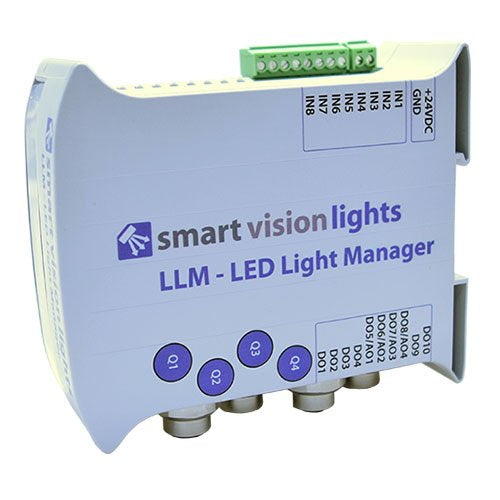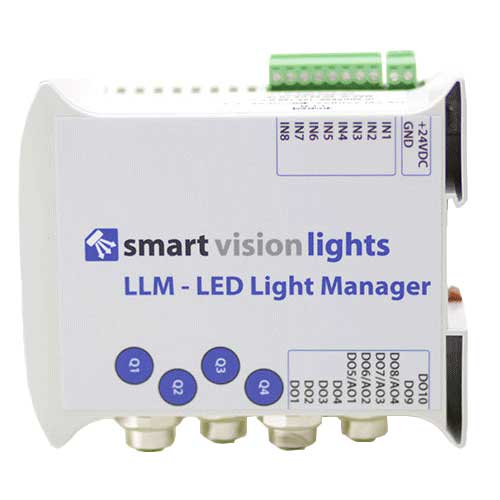Lead Times
Lead Times are estimated based on standard product lead times, but are subject to change. For the latest product lead times, we always recommend contacting us.
Descripción
Smart Vision Lights LLM Technical Specifications
LLM Specifications
| Electrical Input | 24VDC +/- 5% |
| Electrical Input Connector | 2 position screw terminal block – 14 AWG max wire size |
| Operating Current (No Load) | 70 mA |
| Number of Input Channels | 8 (including 1 input channel with interrupt capability) |
| Input Connector | 8 position screw terminal block – 14 AWG max wire size |
| Max Input Channel Voltage | Not to exceed electrical input voltage |
| On / Off Trigger Input |
PNP mode: +4VDC or greater to activate (max 26VDC) NPN mode: GND (<1VDC) to activate |
| Input Channel Current |
PNP line: 4 mA @ 4VDC | 10 mA @ 12VDC | 20 mA @ 24VDC NPN line: 15 mA @ Ground (0VDC) |
| Output Channels | 4 channels for lights plus 2 additional outputs, such as a camera trigger |
| Output Connectors | 4 5-pin M12 connectors 10 position screw terminal block – 14 AWG max wire size (configurable for NPN or PNP) |
|
Total Output Current (M12 Connectors) |
Total Average Output Current: 8 A - sum of all 4 channels (polyfuse protected) Maximum average output current per any 1 channel 2.8 A |
| Trigger Output Current (Per Channel) | PNP (sourcing): 65 mA NPN (sinking): 65 mA |
| Analog Output (Per Channel) |
Voltage: 1–10VDC, continuous mode intensity control Current: 0.5 mA max (with fault protection) |
| Slave Mode | Selectable and configurable with DIP switches |
| Indicator Lights | Power on = Green light Ethernet = 2 indicator lights |
| Protection Circuitry | Polyfuse protection |
| Programming Connector | Ethernet port |
| SD Card | microSD card |
| Reset Button | Hold down for 3 seconds |
| Mounting | DIN rail |
| Dimensions | H = 120 mm (4.7"), L = 107 mm (4.2"), W = 45 mm (1.8") |
| Ambient Temperature | -18º–40º C (0º–104º F) |
| Ambient Humidity | 0–95% non-condensing |
| Weight | ~233g |
| Compliances | CE, RoHS |
|
Warning |
The user must ensure that the potential difference between any combination of applied signals does not exceed the supply voltage. The LED Light Manager (LLM) must not be used in an application where its failure could cause a danger to personal health or damage to other equipment. |
| Terminal Blocks (Included With LLM) | 2 position terminal block plug 8 position terminal block plug 10 position terminal block plug |
LLM - LED Light Manager
The LLM can drive multiple lights of virtually any type or up to four individual zones or channels within an integrated photometric or multispectral ring light solution. Each program can contain up to six sequences with up to four lights set to continuous on, off, any intensity level in between, and even OverDrive™ strobe mode.
To program the four zones of a single LED illumination system such as a ring light or four separate LED light sources, simply connect the LLM to a computer via Ethernet cable and use the browser-based interface to program the light through a series of drop-down menus. The intuitive user interface makes it possible for technicians of any level to set image sequences and program intensities for each light.
The LLM system and light kit bundles initially will target 3D photometric stereo and 2D multi-light applications. When used in conjunction with specialized photometric stereo software from Matrox Imaging, Cognex, TeleDyne DALSA, SICK or MVTec, the lighting system can solve previously intractable tasks, such as finding a defect in the surface of a part. By capturing successive images of a stationary object as it is illuminated by a sequence of lights, photometric image processing software can determine the 3D surface orientation of every pixel across the object’s surface. The same technique can generate 2D images of multiple regions of interest using separate lights and/or cameras.
LLM is also appropriate for multispectral imaging solutions where the LED wavelengths — and not broad-spectrum white lights with optical filters in front of the sensor — are the spectral band selection mechanisms. Using the color of illuminating light as the spectral band selection mechanism can greatly reduce the cost of multispectral imaging solutions, while increasing budgets for imaging applications.
Gastos estimados de envío
Payment & Security
Su información de pago se procesa de forma segura. No almacenamos los detalles de la tarjeta de crédito ni tenemos acceso a la información de su tarjeta de crédito.




